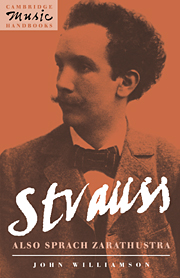1 - ‘Freely after Nietzsche’
Published online by Cambridge University Press: 04 August 2010
Summary
According to Strauss's subtitle, Also sprach Zarathustra is a ‘tone poem freely after Nietzsche’. Any commentary on the work must start from the implications of that description. The central claim is that Zarathustra is in some way ‘poetic’, a term which in the history of nineteenth-century music had carried many resonances. By Strauss's time, music's desire to be considered poetic had hardened into at least one genre, the symphonic poem, a description invented by Liszt for the cycle of twelve single-movement orchestral pieces composed in his Weimar period. Since each of these works had a programme (whether a detailed preface, an allusive title, or a pre-existing text such as a poem), ‘symphonic poetry’ and programme music were usually seen as in some measure related. The Lisztian symphonic poem accordingly was sucked into the debate over programme music which involved composers, historians and aestheticians (together with the musical journalists who acted as propagandists for the various standpoints within the controversy).
Superficially, Strauss used the label ‘tone poem’ to distinguish himself from Liszt. He applied it to a series of one-movement works (each with stated or implied programmes) which could easily have been confused with Lisztian symphonic poems. The confusion was rendered all the more likely because of his known admiration for Liszt. When composing Macbeth (the first of his tone poems), Strauss spoke of it in one letter as ‘a kind of symphonic poem but not after Liszt’.
- Type
- Chapter
- Information
- Strauss: Also sprach Zarathustra , pp. 1 - 9Publisher: Cambridge University PressPrint publication year: 1993

